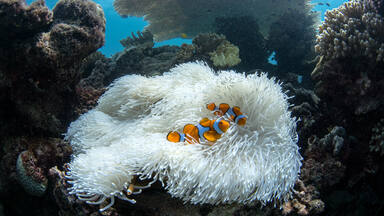Online meeting: How to build coral reef resilience in the face of climate change?
On Thursday 18 May 2023, experts and managers from the Ningaloo Coast (Australia) and Belize Barrier Reef Reserve System (Belize) marine World Heritage sites will share first-hand insights on designing and implementing a resilience strategy that takes a holistic approach in addressing the impacts of climate change and help adapt communities.
The 2016 third Global Marine World Heritage Managers Conference held in the Galapagos Islands (Ecuador) exposed how ill-equipped most World Heritage managers are to tackle the challenges posed by climate change. Particularly for coral reef ecosystems, the urgency is now as most World Heritage-listed reefs are expected to bleach twice-per-decade by 2040.
In response, a pioneering USD$ 10 million climate resilience initiative (Resilient Reefs) was launched that, with the help of an international consortium of partners, allowed four World-Heritage listed coral reefs in Palau, Belize, France, and Australia to embark on a new, leading-edge approach to change the way they understand climate risk and plan for the future. Together with the local management authorities and communities, the initiative is developing climate resilience strategies in each of these pilot sites.
Both Ningaloo Coast (Australia) and the Belize Barrier Reef Reserve System (Belize) just launched their resilience strategies earlier this year and started implementation with initial seed funding for priority actions that will strengthen the resilience of these globally iconic marine protected areas.
Developing a resilience strategy is a powerful tool to help managers of marine protected areas understand and adopt more risk-aware, integrated, and adaptive planning and build resilience for both community and ecosystem. While this particular approach to resilience planning is being piloted in coral reefs, it can easily be replicated across the wider network of marine World Heritage sites, and beyond, across the broader marine protected area community.
This month’s online meeting will feature Ms. Amy Armstrong (Resilient Reefs Director at Great Barrier Reef Foundation) and Dr. Annick Cros (The Nature Conservancy’s Resilient Reefs Network), who will introduce the Resilient Reefs Initiative and associated framework for resilience-based management, as well as insights into steps that sites can take to develop a climate resilience strategy.
Dr. Peter Barnes from Ningaloo Coast (Australia) and Ms. Kalene Eck from the Belize Barrier Reef Reserve System (Belize) will share insights and challenges from their experiences leading the development of community-led resilience strategies for their respective World Heritage sites.
Featured Marine World Heritage Site Managers and Experts
Annick Cros (The Nature Conservancy’s Resilient Reefs Network)
Annick is the Science and Training specialist for The Nature Conservancy’s Reef Resilience Network. She has a PhD from the University of Hawai’i in conservation genetics and 20 years’ international experience working on spatial planning and the design of resilient Marine Protected Areas networks. In 2005, Annick worked on an ecoregional analysis on the lagoons of New Caledonia to help set up its current UNESCO World Heritage site.
Amy Armstrong (Resilient Reefs Director at Great Barrier Reef Foundation)
Amy is a resilience practitioner with deep experience in philanthropy and the public sector. She has a 20-year track record of designing and leading ambitious programs that deliver environmental and social impact across the globe. She currently leads the Resilient Reefs Initiative - a global effort working at the intersection of community development, ecosystem restoration and government transformation, partnering with UNESCO coral reef sites to build the resilience of their reefs and the communities that depend on them.
Kalene Eck (Belize Barrier Reef Reserve System, Belize)
Kalene is the Chief Resilience Officer for the Resilient Reefs Initiative in Belize. Since 2021, she has been working closely with local partners to develop the ‘Strategy for Reef Resilience in Belize’ (released in April 2023). She holds a master’s degree in marine management from Dalhousie University and has over ten years’ experience in working in Belize’s ocean space in various capacities.
Peter Barnes (Ningaloo Coast, Australia)
With a PhD in marine ecology, Peter has been the Ningaloo Marine Park Coordinator with Western Australia’s Department of Biodiversity, Conservation and Attractions managing on-park operations of Ningaloo Marine Park since 2012. Peter is passionate about and worked extensively in developing joint management of the Ningaloo Coast with Traditional Owners and working closely with scientists to deliver projects to inform effective management and conservation.
Several times per year, UNESCO's World Heritage Marine Programme provides an exclusive online platform where managers from the 50 marine World Heritage sites connect and share practical successes in tackling key conservation challenges.
Due to their status as the world’s flagship marine protected areas, marine World Heritage sites are uniquely positioned to drive change and innovation, set new global standards in conservation excellence, and serve as beacons of hope in a changing ocean. The online meetings are made possible thanks to the support of the French Biodiversity Agency and the Great Barrier Reef Foundation. Participation is upon invitation only.




